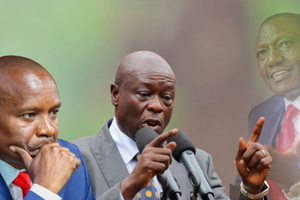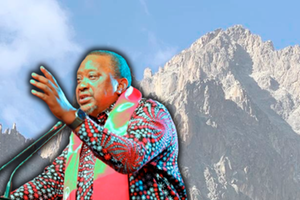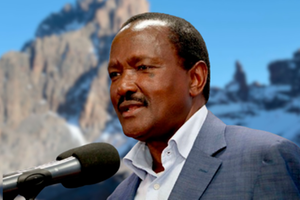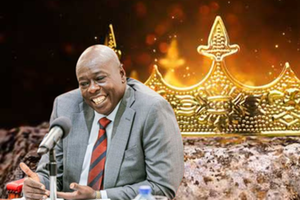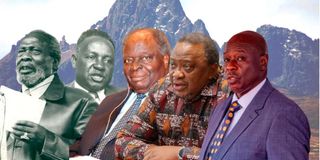
From left: Former President Jomo Kenyatta, Kenneth Matiba, former Presidents Mwai Kibaki, Uhuru Kenyatta and ex-Deputy President Rigathi Gachagua.
In the intricate web of Mount Kenya politics, former deputy president Rigathi Gachagua has created a victimhood narrative and emerged as the self-styled point man —a role he assumes with an intensity that so far brooks little opposition.
His political ascent is nothing short of captivating, to the point where Nyeri Governor Mutahi Kahiga is vowing that those who dare deviate from Gachagua's path will face certain defeat at the ballot box.
Read: Lost in the mountain
If Gachagua has his way, it will not be the first time that Mt Kenya politics will be rotating – not on issues – but on the emotive force of victimhood. Historians contend that the jailing of Jomo Kenyatta created a larger-than-life identity to the extent that Britain carried out research on what they called a Kenyatta-cult.
So forceful was Kenyatta, while in detention, that he became the rallying point on the way independence was negotiated – despite the British trying to rubbish him as a ‘leader unto darkness and death.”
Though Kenyatta ruled for 15 years till his death in 1978, his image had faded with time to an extent that he had been christened “kamaliza” following the assassination of populist politician, J.M. Kariuki and the cover-up that followed.
The next populist to rise in the Mount Kenya region was Kenneth Matiba, whose dramatic fallout with President Daniel arap Moi and subsequent detention propelled the former Cabinet minister to near-mythical status. Matiba's supporters rallied behind him, deeply sympathising with his harrowing ordeal during detention, where he nearly lost his life to a stroke that left him with a permanent limp.
Political freedom
This tragic turn of events not only elevated his political stature but also cemented his place as a symbol of resistance, making him a beloved figure in the eyes of many who saw him as a martyr for the cause of political freedom.
During the first multi-party elections of 1992, Matiba dethroned powerful central Kenya and Nairobi politicos who had decamped to Mwai Kibaki’s Democratic Party. In Matiba’s stronghold, Kibaki was often dismissed as a “coward” for his perceived reluctance to fully champion the push for multi-party democracy. Finally, Matiba secured 1.4 million votes against President Moi’s 1.9 million.
So powerful was the Matiba wave that KANU Secretary General Joseph Kamotho famously quipped that in Central Kenya, "even a dog" could have won on a Ford Asili ticket. Such was the fervour of the moment, a testament to the magnetic pull of Matiba’s defiance.
But this was not a long-lasting wave, and it soon died as Matiba boycotted parliamentary proceedings and decided to boycott the 1998 General Election. By the time he tried to run again in 2007, his star had dwindled to the extent that he got a paltry 8,000 votes behind Pius Muiri and Nazrin Umar.
The next figure to command a comparable groundswell of support in the Mount Kenya region was Uhuru Kenyatta, whose indictment by the International Criminal Court in The Hague over the 2007/2008 post-election violence became the crucible in which his political identity was reforged. Uhuru masterfully wielded the victim narrative, rallying his base with the notion that history was repeating itself.
His supporters drew striking parallels between his predicament and the trials of his father, Jomo Kenyatta, who had been cast as the face of the Mau Mau rebellion during colonial rule. In both cases, persecution—whether real or perceived—became the rallying cry, transforming victimhood into a powerful political weapon.
But by the time he was leaving power, after two terms, Uhuru had lost favour with his central Kenyatta MPS and there was an anti-Kenyatta wave that was propagated by both Ruto and Gachagua in their campaigns. The vote for Ruto was in many ways a chance to punish Uhuru Kenyatta for sins of his father – lands and settlement – and his own, destabilising businesses.
Kenyan politics
Gachagua’s embrace of the victim narrative follows a well-worn path in Kenyan politics. This strategy, deeply embedded in the country’s political fabric, has long served as a powerful tool for galvanizing support and cultivating loyalty. His ability to position himself as a victim—someone wronged and marginalised—closely mirrors the tactics of his former ally, William Ruto. Ruto, too, leveraged this narrative to rally the region behind him, portraying then-President Uhuru Kenyatta as an ungrateful “dynasty” heir who betrayed him by backing Raila Odinga.
While Gachagua presents himself as a “truthful man”, Ruto built his appeal around faith and humility, skilfully using the church as a platform to shape his image.
Ever since he was impeached, Gachagua has taken advantage of his new position to mobilise support, and distance himself from the Ruto administration – which he fervently supported.
Already, he has transformed his Wamunyoro home into a veritable pilgrimage site, the same way Jomo Kenyatta's Gatundu residence became a place to pay homage and for loyalty pledge. The symbolism is unmistakable and Gachagua is using the vernacular stations in the region to inspire Kikuyu nationalism as a platform to reach out to other communities.
As a revered destination for loyalists, Wamunyoro will be a place where devotion and allegiance will be performed. In recent weeks, political volleys have been hurled in the direction of those perceived to be fence-sitting, the same way Kibaki was called a fence-sitter.
Last week, Governor Kahiga appeared to point his fingers at Murang'a Governor Dr. Irungu Kang’ata, who, curiously, has been conspicuously absent from the fray. As the drama unfolds, Kang’ata seems content to watch from the sidelines, his silence a curious contrast to the rising political tides. He is comfortable that Muranga has emerged number one among the recent counties' rankings by pollster Infotrak. But Murang’a politics do not follow the same pattern as Nyeri.
Even when Kibaki was the sole Mount Kenya candidate, his DP struggled to gain traction in Murang’a. It will be interesting to see how long Gachagua’s wave lasts. However, past attempts to install regional kingpins have often faltered-- they rise quickly but fade just as fast, especially once victimhood gives way to political reality. Two years ago, William Ruto touted himself as the Mount Kenya kingpin. Today, the mountain has erupted on his politics with vesuvian temper.
@johnkamau1


